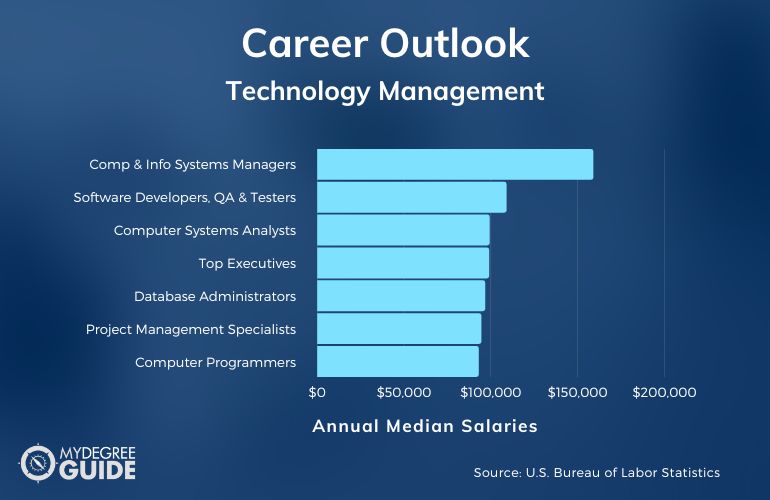You might explore technology management degrees if you are interested in leading teams and using your technical skills to help businesses grow and reach their goals.

Individuals with a combination of technology, business, and management skills are in high demand. Businesses value this unique combination of skill sets, especially as the use of technology continues to grow.
Editorial Listing ShortCode:
As a result, careers in technology management are on the rise, with job growth in this field only expected to continue in the foreseeable future.
Online Technology Management Degrees

Information technology management degrees help students develop interdisciplinary skills in technology, business, finance, management, and leadership. This degree is beneficial for anyone who wants to work with technology and technical systems and has an eye on higher-level careers in management.
Editorial Listing ShortCode:
Students in this program typically have a strong foundation in math and computer skills, as many programs require advanced math and computer science courses.
You could gain many valuable skills and cover a wide variety of topics throughout your program, including:
- Finance and financial management
- Leadership and management
- Business strategies
- Accounting
- Computer science
- Databases and networking
- Risk management
- Marketing
- Systems architecture
- Cybersecurity
- Organization behavior
You could also develop relevant management skills, including communication, empathy, organization, problem-solving, and critical thinking.
In addition to your degree, there are also numerous industry certifications you can earn in technology, management, business, and human resources that could help expand your career opportunities. Professional certifications are often optional, but they can help you demonstrate your proficiencies and skill sets to potential employers.
Industries where graduates often find employment include banking, finance, information technology, government, telecommunications, insurance, sales, and marketing, among others. Many computer and IT careers are seeing faster than average job growth, and businesses continue to need professionals with technology management expertise.
Technology Management Careers & Salaries

After earning your bachelor in technology management degree, you can pursue many potentially lucrative careers using your unique and valuable skills.
While some graduates, especially those with IT experience, may go directly into management positions, others may first gain experience in specific technology careers. These careers can include network administrator, computer systems analyst, database administrator, and IT support specialist.
Based on data from the Bureau of Labor Statistics, listed below are the median salaries of some careers related to the study of technology management.
| Careers | Annual Median Salaries |
| Computer and Information Systems Managers | $159,010 |
| Software Developers, Quality Assurance Analysts, and Testers | $109,020 |
| Computer Systems Analysts | $99,270 |
| Top Executives | $98,980 |
| Database Administrators | $96,710 |
| Project Management Specialists | $94,500 |
| Computer Programmers | $93,000 |
| Operations Research Analysts | $82,360 |
| Network and Computer Systems Administrators | $80,600 |
| Computer Network Support Specialists | $62,760 |
Some graduates use their combination of technology, business, and finance skills to serve as consultants to other businesses, helping them use technology to grow their organizations or services.
Editorial Listing ShortCode:
Graduates may also find careers in project management, technical sales, quality management, technical writing, and production supervision and management. Almost every industry needs individuals with these skills—from banking and finance, sales and marketing, to government organizations and insurance companies.
Bachelor of Technology Management Curriculum & Courses

While the specific coursework will vary between programs in information technology management, below are some common courses you may take as part of your program:
- Organizational Behavior: Students in this course learn how to become effective leaders and managers in diverse settings, by studying theories and practical strategies.
- Technical Communication: In this course, you’ll learn about a variety of skills, including technical writing, web design, coding, content creation, and user experience.
- Understanding Cultural and Social Diversity: This course focuses on skills needed to understand different perspectives and work with diverse groups of individuals.
- Finance Skills for Managers: This course introduces the basics of business finances, including budgeting, statement analysis, and financial forecasting.
- Engineering Economic Analysis: Topics covered in this course include cost analysis, economic fluctuations, depreciation, time value of money, and interest rates.
- Introductory Physics: This course covers essential laws of physics, including electromagnetism, laws of mechanics, and electricity and magnetism.
- Introduction to Spreadsheets: In this course, you’ll learn how to use basic applications to create spreadsheets and how to analyze them for business problems.
- Precalculus: This course prepares you for more advanced math courses, covering math concepts, theories, and functions not previously covered in other math courses.
- Introduction to Human Resource Management: Students are introduced to essential HR management processes, including recruiting, managing, and training.
- Quantitative Analysis for Business: Students in this course learn how to analyze data for business growth and more informed decision-making.
Bachelor’s degrees will also include general education requirements in addition to specific technology management courses.
Admissions Requirements

While admissions requirements vary between schools, below are some common criteria for pursuing a management of technology degree program:
- High school diploma or GED equivalent
- Official academic transcripts
- Minimum GPA requirement of 3.0, on average
- SAT or ACT scores (not required by all schools)
In addition to the admissions requirements listed above, you will also fill out an application, online or on paper, and potentially pay an application fee.
BS in Technology Management Accreditation

As you look into schools and programs that offer degrees in technology management, one factor to consider is the school’s accreditation status.
Schools with regional accreditation have had their faculty, educational offerings, and student services independently verified as meeting high-quality standards. When it comes to transferring schools or pursuing graduate studies, some programs only accept transfer credits and bachelor’s degrees from regionally accredited schools.
Editorial Listing ShortCode:
To verify a school’s accreditation status, you can visit the Council for Higher Education Accreditation’s website.
ATMAE Accreditation
Another factor to consider when choosing a technology management degree is whether it’s accredited through the Association of Technology, Management, and Application Engineering (ATMAE).
ATMAE offers programmatic accreditation for associate, bachelor, and master’s degree programs in areas including applied technology and technology-related disciplines. ATMAE accreditation sets and maintains standards in technology programs and provides valuable benefits, including the confidence that your education meets industry standards.
To learn more and find ATMAE accredited programs, you can visit the ATMAE website.
Technology Management Licensure and Certifications

In addition to your bachelor in technology management degree, you can also pursue professional certifications to increase your earning and hiring potential.
Certification examples include:
- CompTIA A+ Technician: This certification is for entry-level professionals in numerous IT support and end-point management roles.
- Cisco Certified Network Associate (CCNA): This certification verifies your essential networking knowledge and skills for networking positions in the IT field.
- Certified Associate in Project Management (CAPM): This entry-level project management certification verifies your ability to manage a project lifecycle.
In addition to the above, you can also explore a number of certifications in business management.
Financial Aid and Scholarships

As you explore degree programs in technology management, you might also consider various financial aid opportunities that may be able to help with tuition.
Some employers offer tuition assistance programs or reduced tuition with certain schools. Scholarship opportunities may also be available through your school or through various other public and private institutions. You can also look into grants and loans from the state or federal government.
To learn more about potential opportunities, you can visit the Federal Student Aid website.
What Is a Technology Management Degree?

A technology management degree is a multidisciplinary program that helps students develop the necessary skills to manage others in a variety of technical jobs and industries.
Students in this program learn a valuable combination of technology, business, and management skills—from specific IT knowledge to business strategy. Graduates with information technology management degrees may troubleshoot IT issues while also overseeing whole projects, managing budgets, and supervising employees.
Courses in this program cover a wide range of topics, including IT, finance and accounting, organizational management, math, communication, and business analysis.
Is Technology Management a Good Degree?

Yes, technology management is a good degree for many undergraduate students. Careers in this field tend to pay higher than average salaries. For instance, the median salary for computer and information systems managers is $159,010 (Bureau of Labor Statistics).
Demand for these professionals is also expected to continue to grow as technology is needed in nearly every industry. Technology management professionals are critical for businesses to be able to implement and use technology to improve their internal operations as well as their client services.
What Can You Do with a Technology Management Degree?

There are numerous career paths for graduates with information technology management degrees, many of which can pay higher than average salaries.
Graduates with an interest in computer systems and data processing may find employment as computer systems analysts, helping businesses find technology solutions to meet their needs. Many graduates also find employment as database administrators, network administrators, and computer support specialists.
Editorial Listing ShortCode:
Leadership roles in this field can include chief technology officer, chief information officer, IT director, project manager, and management information systems (MIS) director.
For some roles, a master’s degree, such as an on-campus or online masters in technology management, may be required. A number of universities now offer masters in health systems management online or on-campus for those interested to concentrate in the healthcare sector.
How Long Does It Take to Get a Bachelor Degree in Technology Management Online?

How long it will take to complete your management of technology degree will vary based on several factors, including your enrollment status and course schedule.
If your program follows a 16 week semester, it will usually take 4 years to complete your degree in technology management with full-time study. If your program is on an 8 week semester schedule, you may be able to finish your program in less time with year-round enrollment, including during the summer. Part-time study can extend your time to completion.
What’s the Difference Between an Information Systems vs. Information Technology Management Degree?
While information systems and information technology degrees may sound interchangeable, there are some key distinctions between the two degrees.
| Information Systems Management | Information Technology Management |
|
|
Information systems is the overarching term for recording information, with information technology falling under the umbrella of information systems.
What’s the Difference Between a Cyber Security vs. IT Management Degree?
Here are some key differences between cybersecurity management and IT management degrees.
| Cyber Security Management | IT Management |
|
|
These two-degree paths can also include quite a bit of overlap when it comes to their coursework.
Is a Bachelors in Technology Management Degree Worth It?

Yes, a bachelors in technology management is worth it for many students. There’s a growing need for managers and leaders in the computer and information technology field.
According to the Bureau of Labor Statistics, 16% job growth is projected for computer and information systems managers over the next ten years, which is much faster than average. Graduates are able to explore job options in private businesses, government organizations, insurance and healthcare, and a variety of other industries.
Editorial Listing ShortCode:
The need for technology in business is only increasing, so the demand for individuals with a valuable combination of technology, business, and management skills continues to rise.
Universities Offering Online Bachelors in Technology Management Degree Programs
Methodology: The following school list is in alphabetical order. To be included, a college or university must be regionally accredited and offer degree programs online or in a hybrid format.

Alfred State College of Technology offers a Bachelor of Business Administration in Technology Management program online. An associate’s degree or the completion of at least 60 college credits is required before starting the program. The opportunity to complete an internship during the final semester is commonly offered.
Alfred State is accredited by the Middle States Commission on Higher Education.

Arizona State University offers an online program for a Bachelor of Science in Technological Entrepreneurship and Management. The program is designed to teach skills in business, entrepreneurship, leadership, and innovation in the technology sector. The program includes a total of 42 classes that are typically 7.5 weeks long.
ASU is accredited by the Higher Learning Commission.

Athens State University offers a Bachelor of Science in Management of Technology program online. The program aims to keep classes small to provide a personalized learning experience. Classes typically teach both business and technology principles. At least 36 transferable credit hours from a regionally accredited institution must have been earned before admission.
Athens State University is accredited by the Southern Association of Colleges and Schools Commission on Colleges.

Eastern Michigan University offers a program for a Bachelor of Science in Technology Management with core courses available online. The program requires the completion of 66 credit hours of coursework. Up to 3 years of community college technical and general education credits may be accepted, which commonly allows for the program to be completed in just 1 year.
Eastern Michigan University is accredited by the Higher Learning Commission.

Excelsior University offers a Bachelor of Professional Studies in Technology Management program online. Concentrations include Information Technology, Electrical Technology, Nuclear Technology, and Renewable Energy Technology. The program requires the completion of 120 credits, and an average of 74 credits from other programs are accepted by Excelsior. Credit for military and related job training may also be granted.
Excelsior University is accredited by the Middle States Commission on Higher Education.

Herzing University offers an online program for a Bachelor of Science in Technology Management. Classes are available during the day and in the evening to accommodate busy schedules. The program aims to provide a career-focused curriculum, and virtual services including tutoring, advising, and tech support are commonly offered. A rolling admissions process allows for application at any time.
Herzing University is accredited by the Higher Learning Commission.

Southeast Missouri State University offers a Bachelor of Science in Technology Management program online. Potential coursework includes Technical Computer Programming Applications, Manufacturing Research in a Global Society, and Statistical Process Control. An associate’s degree or relevant work experience should have been earned before starting the program.
SEMO is accredited by the Higher Learning Commission.

St. Petersburg College offers a BAS in Technology Development and Management program online. Concentrations include Software Development, Software Assurance, Project Management, Data Science, and Cybersecurity Defense and Risk Mitigation. Classes are typically 8 weeks long and are usually designed by faculty and advisory committee members who work in the field.
St. Petersburg College is accredited by the Southern Association of Colleges and Schools Commission on Colleges.

The University of Northern Iowa offers an online program for a Bachelor of Arts in Technology Management. Courses may occasionally require synchronous meetings in the evenings. The curriculum is designed to teach critical thinking, communication, and problem-solving skills. Completion of an AAS or AAA degree from an accredited institution is typically required for admission.
The University of Northern Iowa is accredited by the Higher Learning Commission.

Utah Valley University offers a Bachelor of Science in Technology Management program online. Up to 45 related credits may be transferred in from an Associate of Applied Science or an Associate of Science degree program completed at a regionally accredited institution. UVU typically offers open admissions.
UVU is accredited by the Northwest Commission on Colleges and Universities.
Getting Your Bachelor’s in Technology Management Degree Online

There is a growing need for individuals with unique skill sets in both business and technology. Earning a bachelor in technology management degree can help jump-start your career in the IT field.
In an on-campus or online information technology degree program, you can develop both technological knowledge and essential management skills. Gaining education and experience in this field could also help prepare you to pursue professional certifications in technology and management. These industry credentials may further increase your earning potential and job opportunities.
If you want to learn to lead others while honing your technical skills, you can start looking into online technology management programs from accredited schools.

